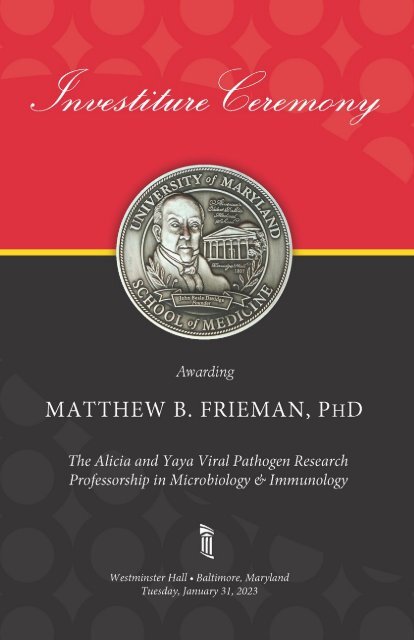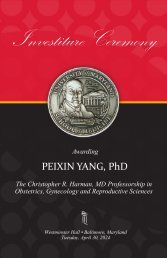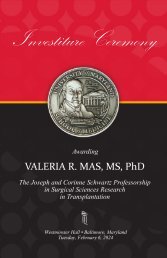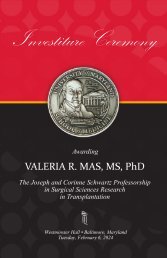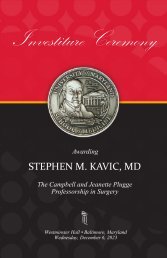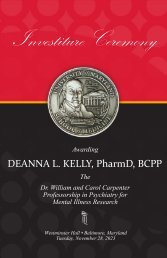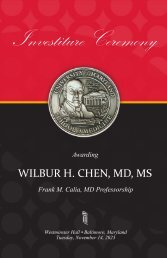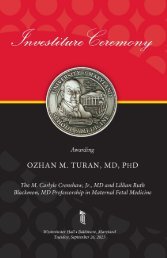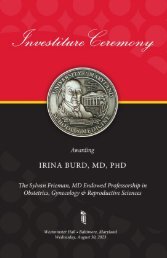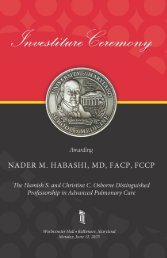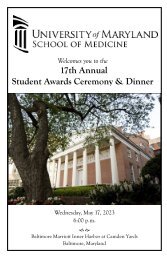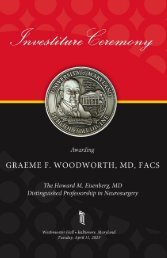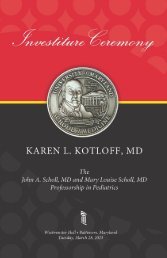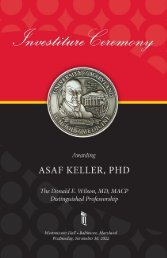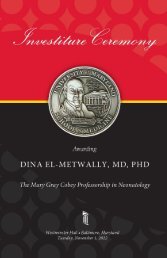Investiture Program for Matthew B. Frieman, PhD
You also want an ePaper? Increase the reach of your titles
YUMPU automatically turns print PDFs into web optimized ePapers that Google loves.
MATTHEW B. FRIEMAN, PHD<br />
<strong>Matthew</strong> <strong>Frieman</strong>, <strong>PhD</strong> is a Professor in the<br />
Department of Microbiology and Immunology<br />
at the University of Maryland School of<br />
Medicine. His research focuses on highly<br />
pathogenic coronaviruses including the Severe<br />
Acute Respiratory Syndrome coronavirus<br />
(SARS-CoV), the Middle East Respiratory<br />
Syndrome coronavirus (MERS-CoV) and now<br />
SARS-CoV-2. Throughout his work he has<br />
balanced the study of the biology of these<br />
viruses with developing therapeutics against<br />
them. His work has been funded by NIH,<br />
BARDA, DARPA, The Bill and Melinda Gates<br />
Foundation and many industry partners,<br />
especially as SARS-CoV-2 emerged.<br />
Dr. <strong>Frieman</strong> grew up in Owings Mills, MD where he graduated Owings Mills High<br />
School in 1994 be<strong>for</strong>e attending Washington University in St. Louis where he<br />
majored in Biology. There he had the privilege to work all four years of college in<br />
the lab of Dr. Craig Pikaard working on ribosomal RNA silencing. It was there that<br />
he learned to love working in a lab, figuring out how to answer scientific questions<br />
and messing up countless experiments. It was there that he met Dr. Jill Fahrner,<br />
whom he would marry in 2003.<br />
He returned to Baltimore in 1998 and received his <strong>PhD</strong> at the Johns Hopkins School<br />
of Medicine where he worked in the lab of Dr. Brendan Cormack on yeast cell wall<br />
proteins. He was Dr. Cormack’s first graduate student and was able to see how to run<br />
a lab from the early stages of its development. Here he built his molecular biology<br />
skills and developed a love <strong>for</strong> yeast, which he uses in his laboratory today.<br />
After his <strong>PhD</strong>, Dr. <strong>Frieman</strong> followed his wife to North Carolina where she was<br />
finishing her MD/<strong>PhD</strong>, and he started a post-doctoral fellowship at the University of<br />
North Carolina at Chapel Hill in 2004 to study coronaviruses in the laboratory of Dr.<br />
Ralph Baric. SARS-CoV had emerged in 2003 and Dr. Baric was a longtime<br />
coronavirus researcher at the <strong>for</strong>efront of studying this new virus. His postdoctoral<br />
work focused on the identification of several SARS-CoV proteins that helped the<br />
virus block the immune response during infection, and how the host responded to<br />
SARS-CoV infection.<br />
In 2009, Dr. <strong>Frieman</strong> returned to Baltimore as an Assistant Professor in the<br />
Department of Microbiology and Immunology to start his laboratory continuing his<br />
work on coronaviruses. Since then, he has studied SARS-CoV, MERS-CoV (which<br />
emerged in 2012) and now SARS-CoV-2 with a focus on understanding the basic<br />
biology of these viruses, how they cause disease and developing therapeutics to fight<br />
them. Early in his research on coronaviruses, he focused on building animal models<br />
to study how the host responds to infection, and what pathways and proteins the<br />
viruses need to replicate and cause disease. These models laid the groundwork <strong>for</strong><br />
research on coronavirus therapeutics, initially <strong>for</strong> SARS-CoV and MERS-CoV, but<br />
rapidly expanded to the study of SARS-CoV-2 in 2020. His lab has collaborated<br />
with many researchers and companies over the years including Regeneron, Novavax,<br />
AstraZeneca, Pfizer, and Eli Lilly on SARS-CoV-2 therapeutics.
WELCOME<br />
Mary Pooton<br />
Associate Dean <strong>for</strong> Development<br />
University of Maryland School of Medicine<br />
James B. Kaper, <strong>PhD</strong><br />
Vice Dean <strong>for</strong> Academic Affairs<br />
James and Carolyn Frenkil Distinguished Dean’s Professor and Chair<br />
Department of Microbiology & Immunology<br />
Distinguished University Professor<br />
University of Maryland School of Medicine<br />
REMARKS<br />
Mark T. Gladwin, MD<br />
Vice President <strong>for</strong> Medical Affairs, UM Baltimore<br />
John Z. and Akiko K. Bowers Distinguished Professor and<br />
Dean, University of Maryland School of Medicine<br />
DONOR RECOGNITION<br />
Mark T. Gladwin, MD<br />
REMARKS<br />
Marco and Debbie Chacón<br />
Donors<br />
SPEAKERS<br />
Brendan Cormack, <strong>PhD</strong><br />
Professor<br />
Department of Molecular Biology and Genetics<br />
Johns Hopkins University School of Medicine<br />
Ralph S. Baric, <strong>PhD</strong><br />
William R. Kenan, Jr. Distinguished Professor<br />
Department of Epidemiology<br />
Professor<br />
Department of Microbiology and Immunology<br />
University of North Carolina at Chapel Hill<br />
Gillings School of Global Public Health<br />
Vineet D. Menachery, <strong>PhD</strong><br />
Assistant Professor<br />
Department of Microbiology and Immunology<br />
University of Texas Medical Branch<br />
MEDAL PRESENTATION<br />
Mark T. Gladwin, MD<br />
REMARKS<br />
<strong>Matthew</strong> B. <strong>Frieman</strong>, <strong>PhD</strong><br />
The Alicia and Yaya Viral Pathogen Research Professor of Microbiology & Immunology<br />
CLOSING REMARKS<br />
James B. Kaper, <strong>PhD</strong>
T<br />
he first endowed professorships were established more than<br />
500 years ago with the creation of the Lady Margaret chairs<br />
in divinity at Ox<strong>for</strong>d and Cambridge Universities. The<br />
original endowed chairs were sponsored by Lady Margaret,<br />
countess of Richmond, and grandmother of Henry VIII in 1502.<br />
Subsequently, private individuals began making financial contributions<br />
to establish other endowed professorships and chairs such as the<br />
Lucasian Chair of Mathematics, which Sir Isaac Newton held beginning<br />
in 1669. Professor Stephen Hawking, the internationally renowned<br />
physicist and recipient of the 2010 US Medal of Freedom, was another<br />
prominent holder of this endowed chair.<br />
The honor associated with appointment to an endowed position has<br />
remained unchanged <strong>for</strong> the last 500 years and is recognized as one of<br />
the highest tributes that an academic institution can bestow upon its<br />
most distinguished faculty. These endowed professorships and chairs<br />
continue to reward exceptional scholars uninterrupted to the present<br />
time.<br />
The Office of Development is charged with securing private gifts to<br />
ensure the School’s tradition of excellence is sustained through robust<br />
research, clinical, and educational programs and initiatives. The<br />
University of Maryland School of Medicine is <strong>for</strong>tunate to have nearly<br />
85 endowed chairs & professorships in various stages of completion<br />
and held by esteemed faculty members.
MARCO AND DEBBIE CHACÓN<br />
Marco and Debbie Chacón have been valued members of the University of<br />
Maryland, Baltimore (UMB) community <strong>for</strong> many years, generously supporting<br />
entrepreneurial, philanthropic, and educational initiatives.<br />
Marco A. Chacón, <strong>PhD</strong>, is an accomplished biotech industry and community<br />
leader who came to the United States in 1967 as a 17-year-old <strong>for</strong>eign exchange<br />
student. Following his return to the United States, the Chacón’s were married in<br />
1972 and put themselves through school. In 1990, following graduate studies,<br />
together they decided to start Paragon Bioservices—a pharma services<br />
company. Over the years, Paragon became a leading CDMO specializing in<br />
GMP manufacturing of viral vectors <strong>for</strong> gene therapy and vaccines. In 2019,<br />
with 200 employees and 220K square feet of labs and manufacturing suites,<br />
Paragon was acquired by Catalent Pharma <strong>for</strong> $1.2B. Catalent currently<br />
employs approximately 2,000 scientists, bioprocess engineers and skilled staff<br />
at three sites in Maryland—including the UMB BioPark.<br />
Following his calling as an entrepreneur, in 2019 Marco founded Irazu Bio (an<br />
early-stage technology development company) and in 2022 spun off Irazu<br />
Oncology, LLC—a company that is developing cancer vaccines, in<br />
collaboration with the University of Maryland SOM’s Center <strong>for</strong> Vaccine<br />
Development. Marco also serves as CSO of Wex<strong>for</strong>d Science & Technology.<br />
Marco’s Board activities include: UM’s School of Medicine and the Center <strong>for</strong><br />
Breakthrough Medicines (King of Prussia, PA.) He also served as Trustee of<br />
the UMB Foundation and was appointed in 2016 to the Maryland Life Sciences<br />
Advisory Board by Governor Hogan.<br />
Be<strong>for</strong>e co-founding Paragon Bioservices, Debbie worked as a copywriter and<br />
was a songwriter <strong>for</strong> SONY Music Entertainment. She has songs on several<br />
albums, including Julio Iglesias and Vikki Carr.<br />
After their successful Paragon exit, the Chacón’s wanted to give something<br />
back to society. They founded The Alicia and Yaya Foundation—which<br />
supports science, education, children and the less <strong>for</strong>tunate—to help create a<br />
better world.


